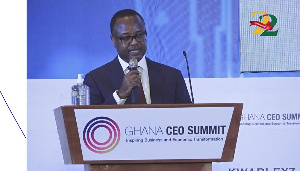 Maxwell Opoku-Afari, First Deputy Governor of the Bank of Ghana
Maxwell Opoku-Afari, First Deputy Governor of the Bank of Ghana
First Deputy Governor of the Bank of Ghana, Dr Maxwell Opoku-Afari has said that efficiency in expenditure requires public financial management reforms that increase the efficiency and transparency of public spending.
He said this can be helpful in supporting tax reform efforts.
Dr Opoku-Afari explained that conscious efforts are therefore needed to be made to ensure that we stamp out misapplication in the management of the public purse not only through punitive action but also by implementing recovery measures to ensure that the public purse is protected.
He has therefore called for support for the Office of the Special Prosecutor (OSP) and the Auditor General (AG) in making sure that the public purse is protected from abuse.
Delivering a public lecture at the University of Ghana Business School on Thursday, September 2, on the topic “Re-thinking development financing: macroeconomic management when the love is gone” he said “Efficiency in expenditure also requires public financial management reforms that increase the efficiency and transparency of public spending, and this can be helpful in supporting tax reform efforts.
“Professionalism and morale can be compromised unless the government shows real commitment to efficient utilization of state resources. Conscious efforts are therefore needed to be made to ensure that we stamp out misapplication in the management of the public purse not only through punitive action but also by implementing recovery measures to ensure that the public purse is protected. And in this regard, we should all support the recent work being done by the Auditor General and the appointment of the new Special Prosecutor.”
“No matter the efforts we make towards enhancing domestic revenue mobilization, we will continue to experience chronic fiscal deficits and a growing debt burden if we do not take steps to rationalize our expenditure levels. The high levels of government spending required to close the huge infrastructure deficit and debt are limiting fiscal room for manoeuvre.
“This, therefore, calls for the kind of fiscal consolidation that involves both revenue-raising measures and expenditure-rationalization policies, with the aim of reducing the overall fiscal deficit to sustainable levels and achieving structural fiscal balance over the medium term. This is achievable when governments are efficient and serve as a catalyst for private-sector-led growth and development.
“We, therefore, need to identify areas where spending is either wasteful, inefficient or does not deliver value for money, with the view to curtailing or eliminating them completely”.
“Negotiation of government projects and contracts must be effectively handled and scrutinized to ensure that losses are minimized, and facilitate value for money considerations.”
“I think we need a change in mindset when it comes to negotiating such state projects. We must ask ourselves these key questions: to what extent does the State benefit from such projects? and what are the feasibility studies and cost-benefit considerations that go into these? Technical, operational, financial and economic feasibility must be paramount in such decisions.”